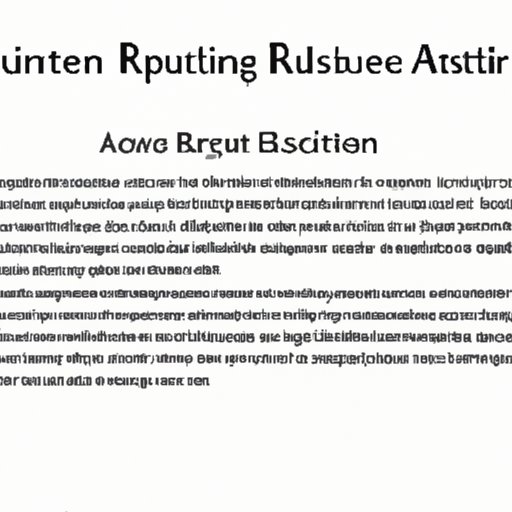Introduction
Rebuttal is an important part of argumentative writing. It is a technique used to counter an opposing argument by presenting evidence and reasoning that refutes it. In this article, we will explore the definition of rebuttal and its purpose in writing. We will also discuss how to craft a strong rebuttal for your argumentative essay, the role of rebuttal in persuasive writing, and tips and strategies for writing an effective rebuttal.
Definition of Rebuttal and Purpose of Rebuttal in Writing
A rebuttal is a response to an argument or claim made by someone else. It is a way of expressing disagreement with the original statement and providing evidence and reasoning that refutes it. The main purpose of a rebuttal is to show that the original argument is flawed or unsupported. By presenting a well-crafted rebuttal, you can strengthen your own position and make your argument more convincing.
How to Craft a Strong Rebuttal for Your Argumentative Essay
Writing a strong rebuttal for your argumentative essay requires careful planning and research. Here are some steps to help you craft a compelling rebuttal:
Identifying the Opposing Argument
The first step is to identify the opposing argument. Make sure you understand the other side’s point of view and the reasons they are making their case. Once you have identified the opposing argument, you can begin to craft your rebuttal.
Researching to Support Your Argument
In order to provide a strong rebuttal, you must be able to back up your argument with facts, statistics, and logical reasoning. Therefore, it is essential to do thorough research on the topic before you start writing. Gather evidence from reliable sources to support your argument and refute the opposing argument.
Utilizing Logical Reasoning and Evidence to Rebut the Opposing Argument
Once you have gathered evidence to support your argument, you can start crafting your rebuttal. Use logical reasoning and evidence to refute the opposing argument. Provide facts and examples to back up your claims and demonstrate why the other side’s argument is flawed or unsupported.

A Guide to Utilizing Rebuttal Effectively in Academic Writing
When writing an argumentative essay, it is important to utilize rebuttal effectively. Here are some tips to help you write an effective rebuttal:
Outlining Your Argument
Before you start writing, it is important to outline your argument. This will help you organize your thoughts and ensure that your argument is clear and concise. Outlining your argument will also help you identify which points need to be rebutted.
Choosing Which Points to Rebut
When crafting your rebuttal, it is important to focus on the most important points of the opposing argument. Choose the points that are strongest and most likely to persuade the reader. Make sure to choose points that you can effectively refute with evidence and logical reasoning.
Crafting a Concise and Well-Supported Rebuttal
Once you have chosen the points you want to rebut, you can start writing your rebuttal. Make sure your rebuttal is concise and well-supported by evidence and logical reasoning. Use facts, statistics, and examples to back up your claims and refute the opposing argument.

Understanding the Role of Rebuttal in Persuasive Writing
Rebuttal is also an important part of persuasive writing. When writing a persuasive essay, it is important to consider the role of rebuttal in your argument. Here are some tips to help you use rebuttal effectively in persuasive writing:
Establishing Credibility
When writing a persuasive essay, it is important to establish your credibility. Providing a well-crafted rebuttal is one way to do this. By showing that you have considered the opposing argument and refuted it with evidence and logical reasoning, you can demonstrate your knowledge and expertise on the topic.
Understanding Your Audience
It is also important to consider your audience when crafting your rebuttal. Understand who you are writing for and what kind of language and tone will be most effective. Make sure your rebuttal is tailored to your audience and appeals to their beliefs and values.
Creating an Effective Tone
Finally, it is important to create an effective tone. Make sure your rebuttal is respectful and professional. Avoid inflammatory language and personal attacks. Focus on presenting the facts and logical reasoning to refute the opposing argument.
Tips and Strategies for Writing an Effective Rebuttal
When crafting a rebuttal, it is important to keep certain tips and strategies in mind. Here are some tips and strategies for writing an effective rebuttal:
Using Facts and Statistics
When rebutting the opposing argument, it is important to use facts and statistics to back up your claims. Make sure the facts and statistics you present are accurate and up-to-date. This will help to make your argument more persuasive and credible.
Refuting Specific Claims
When crafting your rebuttal, make sure to address specific claims made by the other side. Refute each claim individually and provide evidence and logical reasoning to back up your claims. This will make your rebuttal more effective and persuasive.
Addressing Counterarguments
When crafting your rebuttal, make sure to address any counterarguments that may be presented. Anticipate potential counterarguments and prepare responses in advance. This will help to strengthen your argument and make it more convincing.

Analyzing the Impact of Rebuttal on Argumentative Writing
Rebuttal is an important part of argumentative writing. Using rebuttal can have a positive impact on your writing. Here are some ways that utilizing rebuttal can improve your argumentative writing:
Strengthening Your Argument
Using rebuttal can help to strengthen your argument and make it more convincing. By presenting a well-crafted rebuttal, you can refute the opposing argument and make your own argument more persuasive.
Enhancing Your Critical Thinking Skills
Crafting a rebuttal also requires critical thinking skills. You must analyze the opposing argument and develop a logical response to refute it. This can help to enhance your critical thinking skills and make your argument more effective.
Improving Your Writing Style
Finally, utilizing rebuttal can help to improve your writing style. Crafting a rebuttal requires precise and well-structured language. This can help to improve your writing style and make your argument more convincing.
Conclusion
In conclusion, rebuttal is an important part of argumentative writing. It is a technique used to counter an opposing argument by presenting evidence and reasoning that refutes it. Crafting an effective rebuttal requires careful planning and research, as well as an understanding of the role of rebuttal in persuasive writing. Utilizing rebuttal effectively can have a positive impact on your argumentative writing, helping to strengthen your argument, enhance your critical thinking skills, and improve your writing style.
(Note: Is this article not meeting your expectations? Do you have knowledge or insights to share? Unlock new opportunities and expand your reach by joining our authors team. Click Registration to join us and share your expertise with our readers.)
